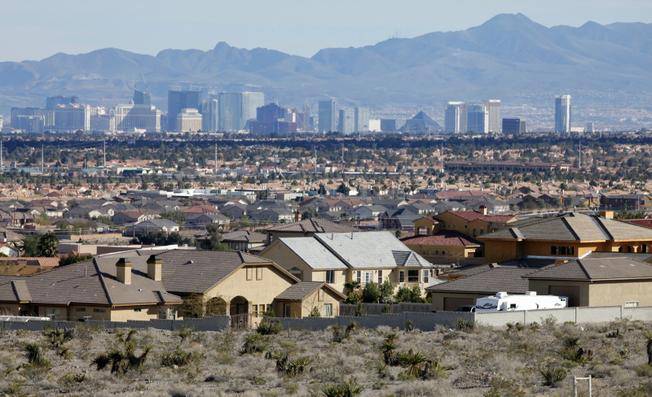
Associated Press File
Data released Thursday show more homes are falling into foreclosure in the Las Vegas Valley. The rate of foreclosure filings increased in June compared to May.
Published Thursday, July 16, 2009 | 10 a.m.
Updated Thursday, July 16, 2009 | 1:08 p.m.
Home foreclosure filings accelerated in Las Vegas and Nevada in June, suggesting further trouble for the state's real estate market.
RealtyTrac, an Irvine, Calif., company that tracks foreclosure activity, today reported 8,726 notices of default were filed in Nevada in June. Total filings, including notices of default and notices of intent to auction, reached 18,764 in Nevada in June -- up 9.37 percent from May, RealtyTrac said.
In Clark County, June notices of default totaled 7,335, down from 7,643 in May. But they increased for two rural counties that rank high in RealtyTrac's list, totaling 115 in Nye County in June, up from 87 in May; and 192 in Lyon County, up from 85 in May.
For Clark County, total foreclosure filings -- including notices of intent to auction and properties turned over to banks -- reached 15,885 in June, up from 14,681 in May.
Nevada led the nation in foreclosure filings, on a percentage basis, not only in June but in the first half of 2009 and in the second quarter, RealtyTrac said.
And, illustrating that the foreclosure problem is not limited to the urban Las Vegas area, Nye and Lyon counties joined Clark County in ranking among the top 10 counties nationwide for foreclosure activity in the first six months of the year.
Clark County was No. 1 in the nation on that list, with 1 in 13 Las Vegas-area households receiving a foreclosure filing. Lyon County was tied for third place on that nationwide list with Nye County ranked No. 7.
The problem in Nevada, which started with the subprime mortgage crisis exploding into record foreclosure numbers, has been fed more recently by layoffs and difficulties in the big gaming and construction industries.
The state's unemployment rate of 11.3 percent in May was up from 10.6 percent in April, leaving thousands of residents unable to make their mortgage payments or qualify for home loans.
But the state is not alone in feeling the fallout of the subprime mortgage crisis and high unemployment nationwide.
RealtyTrac said 1.9 million foreclosure filings -- default notices, auction sale notices and bank repossessions -- were reported on 1.5 million U.S. properties in the first six months of 2009, a 9 percent increase in total properties from the previous six months.
"In spite of the industry-wide moratorium earlier this year, along with local, state and national legislative action and increased levels of loan modification activity, foreclosure activity continues to increase to record levels," James J. Saccacio, chief executive officer of RealtyTrac, said in a statement. "Unemployment-related foreclosures account for much of this increased activity, and the high number of borrowers who find themselves owing more on their mortgages than their homes' are now worth represent a potentially significant future risk. Stemming the tide of foreclosures is a critical component to stabilizing the housing market, so it is imperative that the lending industry and the government work in tandem to find new approaches to address this issue."
Despite the increase in June foreclosure filings in Nevada and Clark County, an official with the Greater Las Vegas Association of Realtors said local Realtors expect home sales to stay strong and prices to hold up as buyers emerge to pick up the foreclosed properties.
The Realtors earlier this month reported a record 4,702 home sales locally in June, with the median price of $140,000 remaining steady from May.
"Our sales volume is up and consumer confidence is returning," said Rick Shelton, a RE/MAX broker and president-elect of the GLVAR.
In one sense, foreclosures are helpful to the market, Shelton said.
"We need the inventory," he said. "The demand is exceeding the supply."
Still, Shelton said he's frustrated by the glut of bank-owned homes on the market. These properties don't move quickly as banks frequently are slow to sell them, he said.
And he'd like to see many of the foreclosures avoided. That can happen if banks would more frequently keep people in their homes by extending the length of mortgages and lowering interest rates so their payments are affordable.
And when that's not possible, he said, the lenders should work more with homeowners on short sales in which the banks and the homeowners each take losses for the underwater equity in the homes -- and the selling homeowners can move along with their credit ratings intact so they can buy more affordable properties.

Join the Discussion:
Check this out for a full explanation of our conversion to the LiveFyre commenting system and instructions on how to sign up for an account.
Full comments policy